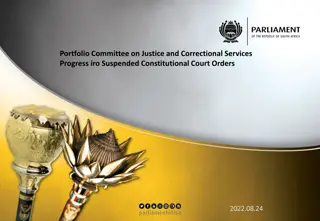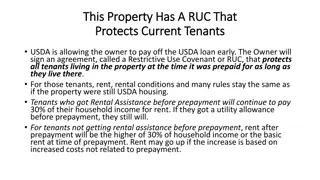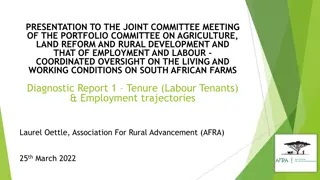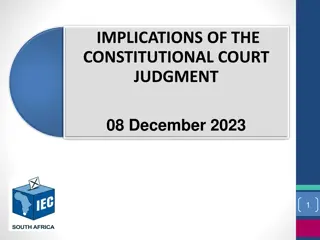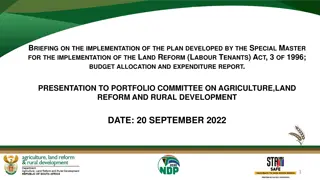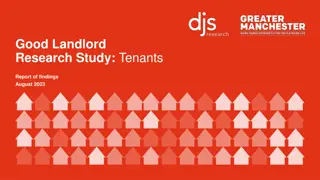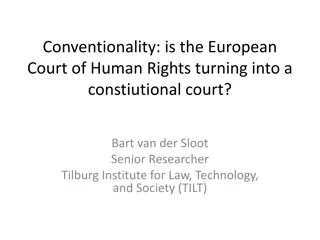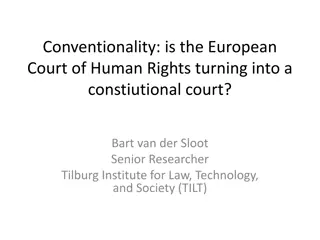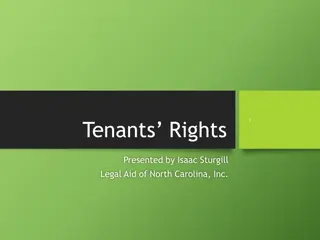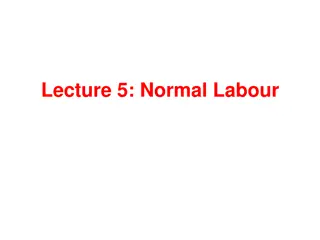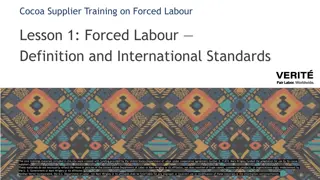Progress Report: Implementation of Constitutional Court Ruling on Labour Tenants' Claims
The progress report outlines the implementation of the Constitutional Court ruling regarding the settlement of labour tenants' claims, focusing on the appointment of a Special Master, the establishment of the office, an implementation plan, and the background of the case. It describes the court order, the role of the Special Master, and the appointment process, with detailed information on the history and objectives of the case.
Download Presentation

Please find below an Image/Link to download the presentation.
The content on the website is provided AS IS for your information and personal use only. It may not be sold, licensed, or shared on other websites without obtaining consent from the author. Download presentation by click this link. If you encounter any issues during the download, it is possible that the publisher has removed the file from their server.
E N D
Presentation Transcript
Progress Report: Implementation of the Constitutional Court Ruling regarding the settlement of Labour Tenants claims Presentation to the Portfolio Committee on Agriculture, Land Reform and Rural Development 15 July 2020
CONTENT Background Constitutional Court Order Court Description of the Special Master Appointment of the Special Master Establishing the Office of the Special Master Implementation Plan Conclusion 2
BACKGROUND The Land Reform (Labour Tenants) Act 3 of 1996 required labour tenants to submit applications for an award of land by 31 March 2001. 20 325 applications were lodged. 10 992 are settled; 9 333 applications are outstanding. In settling the applications, grant-based subprogrammes such as the Settlement Land Acquisition Grant and the Land Redistribution for Agricultural Development Grant were used until 2009. In 2009 there was a policy shift towards land development and state acquisition of land, hence grant-based sub-programmes were abolished. This led to a collapse of the labour tenants programme between 2010 and 2015. A class action was brought to compel the Department to process the remaining labour tenant applications, which ended at the Constitutional Court. 3
CONSTITUTIONAL COURT ORDER The Constitutional Court confirmed an order that had earlier been made by the Land Claims Court that: Declared that the Department s failure to process labour tenant applications is inconsistent with the Constitution; Ordered that a Special Master for labour tenants be appointed, and defined an appointment process. Ordered the Special Master to prepare, in collaboration with the Department, and submit to court by 31 March 2020, an implementation plan for the settlement of the labour tenant applications by the Department, under supervision of the Special Master. The court would thereafter consider any objections to the plan and approve it with or without amendments. 4
CONSTITUTIONAL COURT DESCRIPTIONOFTHE SPECIAL MASTER The Constitutional Court described a Special Master as an agent of the court, and an extension of the Court s own supervisory jurisdiction. A Special Master derives his or her powers from appointment as an agent of the court, continuingly subject to court control and authority; and is therefore an extension of judicial independence. A Special Master is a neutral third-party expert that is not affiliated with any of the parties, accountable to the court. The main task of a Special Master is to oversee and monitor rather than usurping performance of executive functions. 5
APPOINTMENTOFTHE SPECIAL MASTER Consequent to the order of the Constitutional Court, the Land Claims Court appointed Professor Richard Levin as the Special Master of Labour Tenants for a period of 5 years. He assumed his duties on 2 January 2020. The Land Claims Court permitted the Special Master, in consultation with the Minister and Director General: To return to the court and obtain approval of the appointment of staff to his support team; and To appoint consultants to provide opinions, reports and other assistance to the Special Master. The Land Claims Court ordered that the costs of the Special Master be borne by the Department. 6
ESTABLISHINGTHE OFFICEOFTHE SPECIAL MASTER The appointment of the Special Master of labour tenants is the first of its kind in South Africa. There has been uncertainty regarding the establishment and staffing of the Office, which was exacerbated by the tight timelines the Special Master was given by the court to develop an implementation plan. The plan was to be submitted to court by 31 March 2020. In January 2020 the Minister approved the appointment of four officials on a fixed term contract as additional to the establishment of the Department, and seconded them to the Office of the Special Master. They assumed their duties in January and February 2020. The appointments were done in terms of Regulation 57 (2) (b) of the Public Service Regulations. 7
ESTABLISHINGTHE OFFICEOFTHE SPECIAL MASTER The appointments were as follows: Name and Surname Position Annual Salary Prof Richard Levin Special Master R2, 228, 820 Mr Kola Jolaolu Senior Manager: Systems and Operations R1, 521, 591 Mr Donovan Williams Senior Manager: Communications, Media Engagement and Corporate Affairs R1, 252, 183 Ms Mpho Moholo Senior Manager: Stakeholder Management R1, 252, 183 Mr Reginald Khanzi Office Manager R1, 057, 326 The Department provided the Special Master with permanent office accommodation in the Offices of the Department, and has budgeted R27 million for the operational costs for the Office of the Special Master for the 2020/21 financial year. 8
IMPLEMENTATION PLAN The Land Claims Court ordered the Special Master to collaborate with the Department to develop and submit to court by 31 March 2020 an Implementation Plan setting out: The total number of claims lodged to date, and the number which have not yet been processed and finalised; An assessment of the skill pool and other infrastructure required for processing labour tenant claims, and to what extent such skill pool and infrastructure is available within the Department; Targets, on a year to year basis, for the resolution of pending labour tenant claims, either by agreement or by referring the claim to the Court; A determination of the budget necessary during each financial year for carrying out the Implementation, including both the Department s operating costs for processing claims and the amounts required to fund awards made pursuant to applications in terms of section 16 of the Act; Plans for co-ordination with the Court to ensure the rapid adjudication or arbitration of unresolved claims referred to the Court in terms of section 18 (7) read with section 19 to 25 of the Act; and Any other matters which the special master may consider relevant. 9
IMPLEMENTATION PLAN The Special Master submitted to the Land Claims Court an Implementation Plan for the settlement of labour tenant applications on 29 May 2020. The delayed submission was a result of the declaration of the national state of disaster and regulations thereto. The Land Claims Court requested the Department to file a report indicating whether there were parts of the Implementation Plan that it objected to. The Department filed such report with reasons for objections. A hearing to consider the Implementation Plan was held on 19 June 2020 and the Land Claims Court ordered that a new Implementation Plan be developed by the Special Master in collaboration with the Department. The court ordered that a meeting for this purpose take place on 1 to 3 July 2020, and on any other days as may be required. The Special Master was ordered to deliver the revised plan by 31 July 2020 to the Department and the Applicants (AFRA) in the court case; and file the report with their inputs on 17 August 2020. A hearing to consider the new Implementation Plan will take place on 24 August 2020. 10
CONCLUSION The Special Master and the Department held a planning workshop on 1 to 2 July 2020 as ordered by the Court. Further and continuous engagements in this regard are being held. The Department has made available 93 Officials that are settling labour tenant applications, and who will implement the plan. The Department has budgeted for the acquisition of land to settle labour tenant applications, and to provide secure land tenure to farm dwellers as follows: Financial Year: 2020/21 2021/22 2022/23 Household Budget: 230.5 million 276.8 million 258.1 million The Department will reprioritise its Programme 3 budget should additional funding be required to settle the labour tenant applications. 11











